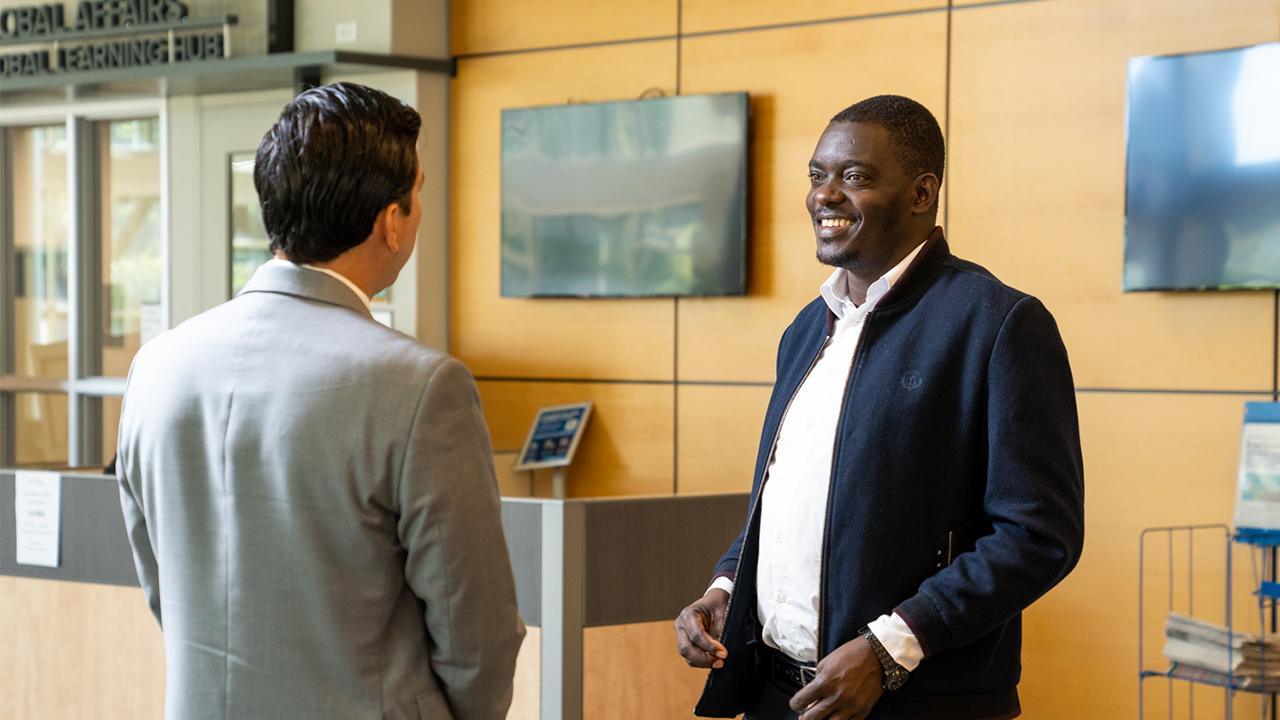
Meet Silas Ekesa, 2022-23 Hubert H. Humphrey Fellow
Silas Ekesa
What motivates you?
About Silas David Ekesa
Pronouns: he/him
Country: Kenya
Occupation: Conservation education
Field: Environmental and natural resources
"Identifying opportunities and innovative means to provide solutions to pressing environmental challenges are my drive and motivation."
What drew you to your professional field?
"I grew up in a village where there were no permanent structures. We lived peacefully with wildlife and foraged a lot on fruits from the nearby forests and bushes. We even fed on wild mushrooms, termites, some beetles and many other wild foodstuffs. Back then, we rarely fell sick and we rarely lacked what to eat even with our big family and a small piece of land. In fact, the first time I visited a hospital in my sane mind was when I got involved in an accident during my final year of my primary school education.
"My dad worked as a ranger in the forest department. He always motivated us and encouraged us to take care of anything green and any wild animal we see because to him, we were created to be caretakers. It is this word "caretaker" that has always set me on a path to being an environmental steward and an advocate of peaceful coexistence between man and wildlife. Later in life, I saw the sense myself and realized we are never going to be alive if our environment is not healthy."
Why did you apply for the Hubert H. Humphrey Fellowship Program?
"Throughout my professional life since first getting into the field, I realized that our environment is on the brink of extinction. During my usual visits to various places, I have seen forests being logged illegally, tons of charcoal being ferried by lorries and motorbikes from pristine forest areas. During my stint at the coast, I carried out various de-snare surveys with community members and learning institutions. What was clear to me is that the purported custodians lack passion and have been drawn into conflicts of interest. The law is not properly enforced and communities living next to protected areas do not seem to benefit from the wildlife resources. There is therefore a need for passionate conservationists like me who will empower community members to be the local custodians of these resources. To do this, I needed to understand environmental policies and natural resources management in order to develop that professional competence hence my application for this fellowship."
What do you hope to take away from this fellowship and apply to your work or at home?
"I look forward to learning in a very competent environment, networking and garnering knowledge in natural resources management and environmental policy as well as climate change. I believe that through this knowledge, I will be able to continue working with community members and learning institutions and further step up my approaches to climate change mitigation projects that will aim to restore degraded landscapes and improve livelihood. Working with other organizations in the U.S. that focus on the same goals will help me understand how other players in the field are using various tools and methods to alleviate poverty while ensuring a sustainable future for the environment. Working with other fellows from various countries and backgrounds combined with the various professionals and organizations will help me create a working network that I can use for raising funds for my various projects, get professional advice and engage them on local and international approaches to similar challenges."
What is something from your country that you would like to share with the UC Davis community?
"Currently, my country is focused on achieving 10% forest cover nationally. However, with heavy infrastructural development, corruption, poor management of government projects and lack of community-steered conservation initiatives, these goals face a lot of hurdles in their implementation. Fortunately, there is an increasing number of youth activists who are working together to push the government towards implementing climate-smart agriculture and infrastructure. These youths have the power to change the way the government works and the community's perception of environmental conservation. I would like to continue being part of these youths with impact after the fellowship and share with them the knowledge and experience learned during the fellowship in order to fast-track the process of climate change mitigation through various initiatives."
How would you like to engage with UC Davis and the community here?
"My opportunity to interact with the UC Davis community presents me with a valuable chance to learn from well-seasoned professionals, explore the many available learning resources on campus and maximize my off-campus engagement with the community through volunteering.
"Through these interactive opportunities with professors from various faculties, leaders from various local and international U.S.-based organizations, and individuals in various social events, I intend to establish both professional and academic networks that I can leverage on when implementing climate-smart projects that enhance community resilience and restoration of degraded landscapes in Kenya.
"Finally, I intend to gain new leadership skills and knowledge in new areas such as GIS, project management and environmental impact assessment to apply the same in the implementation and monitoring of our projects back in Kenya and help learning institutions understand the significance of these tools in implementing environmental projects."